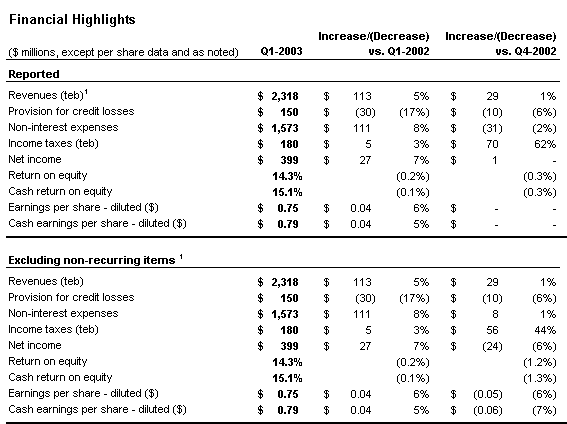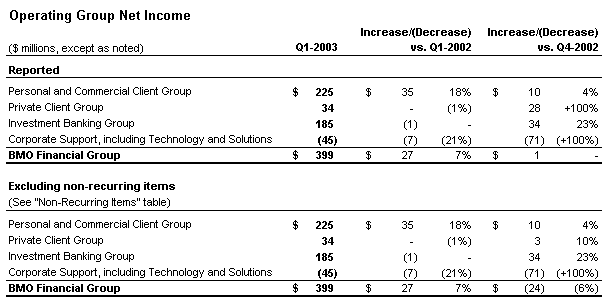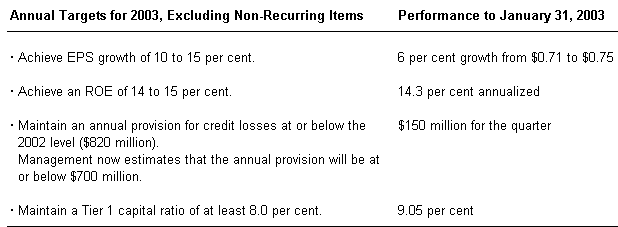News Releases
|
PDF format of entire Quarterly news release including Operating Highlights, Printer-friendly version of Operating Highlights only Solid Growth of 18 per cent in Personal and Business Banking Drives Increased Earnings Year-over-Year Operating Highlights are:
All Earnings per Share (EPS) measures in this release refer to diluted EPS unless specified otherwise.
Ottawa, February 25, 2003 – BMO Financial Group reported net income of $399 million and EPS of $0.75 for its first quarter ended January 31, 2003, compared with net income of $372 million and EPS of $0.71 in the first quarter of last year. Cash earnings, which reflect the add-back of the amortization of intangible assets, were $421 million and cash EPS was $0.79. There were no non-recurring items for reporting purposes in the quarter. “Fiscal 2003 is off to a reasonable start,” said Tony Comper, Chairman and Chief Executive Officer, BMO Financial Group. “Solid growth in personal and commercial banking volumes in both Canada and the U.S. continue to drive our performance. Our investment banking and wealth management groups are managing their businesses effectively within the constraints of the challenging market environment, as evidenced by their stable year-over-year performances. In this context, BMO’s improved performance from a year ago is encouraging. We have achieved growth while at the same time continuing to build a foundation for the eventual return of sustained strength in the economy and stability in equity markets.” BMO shareholders earned a return of 9.2 per cent on their investment in common shares in the first quarter. The total shareholder return for the past twelve months of 18.4 per cent was the best of Canada’s major banks, comparing favourably with the six-bank average of 1.6 per cent and the TSX Composite Total Return of negative 12.5 per cent. Net income rose $27 million from a year ago, driven by higher revenue and a lower provision for credit losses, partially offset by increased expenses. The $113 million revenue increase was only modestly above the expense increase, partially due to the results of acquired businesses. Revenue rose five per cent from the prior year, driven by volume growth in Personal and Commercial Client Group, acquired businesses in Private Client Group, and improved mergers and acquisitions and underwriting fees in Investment Banking Group. These increases were mitigated by narrowing margins resulting from the maturity of higher yielding assets in our capital markets businesses and lower corporate lending volumes that reduced net interest earnings in Investment Banking Group. Expenses rose eight per cent year-over-year, driven by acquired wealth management businesses, higher benefits costs, including pension costs, and higher stock-based compensation costs. The expense-to-revenue ratio was 67.9 per cent, up from 66.3 per cent a year ago but improved from the fourth quarter’s ratio of 70.1 per cent (68.3 per cent excluding non-recurring items). Acquired businesses increased revenues in the quarter by $68 million year-over-year and expenses by $84 million. Excluding the effect of those businesses, the expense-to-revenue ratio was 66.2 per cent, just below the ratio of a year ago. The provision for credit losses was $150 million, down from $180 million a year ago. Gross impaired loans decreased from the fourth quarter as new impaired loan classifications totalled $307 million, down $155 million from the immediately preceding quarter and broadly in line with expectations at this point in the credit cycle. Exposures to industry groups that are currently more economically sensitive, such as communications and power and power generation, continue to represent a small part of BMO’s loan portfolio. The allowance for impaired loans in these industries, as in other sectors, is considered to be adequate. Management now estimates that the annual provision for credit losses will be at or below $700 million for 2003, better than management’s target of an annual provision at or below $820 million, which had been established following the fourth quarter. Revenue from U.S. based businesses totalled $705 million, representing 30 per cent of total revenue, compared with 31 per cent a year ago. The current quarter’s ratio benefited from the wealth management acquisitions of the past year. Earnings sourced in the United States represented 17 per cent of net income, compared with 30 per cent a year ago. Improved first quarter performance from our Canadian operations relative to the U.S., and a strengthening Canadian dollar contributed to the decline. The decline was also attributable to investment banking and wealth management operations in the United States where geopolitical uncertainties have affected client transaction volumes, and the maturing of higher yielding assets has narrowed spreads. Non-cash amortization costs of acquired U.S. wealth management businesses also affected the comparative ratios. Relative to the fourth quarter, net income was unchanged on a GAAP basis but declined $24 million or six per cent after excluding the fourth quarter’s $39 million ($25 million after tax) of non-recurring acquisition-related costs. Improved revenues and a lower provision for credit losses were more than offset by a higher provision for income taxes. Expenses rose modestly in the current quarter. Effective this quarter, certain enhancements have been reflected in funds transfer pricing related to Harris Bank businesses. Harris Bank has implemented a new instrument-level matched-maturity funds transfer pricing system that incorporates industry best practices. Concurrently, certain Harris Bank portfolios that were used to manage interest rate risk have been transferred from operating groups to Corporate Support. The new system and portfolio transfers shift structural interest rate risk from the business units to the Corporate Support unit. Refinements to BMO’s funding and cost allocations have also been implemented. All of these enhancements have been applied retroactively and segmented results for prior periods reflect the reclassifications. Note 7 to the attached unaudited interim consolidated financial statements outlines the reclassifications affecting prior period results.
2003 Earnings Outlook Unchanged Note on Performance Analysis Bank of Montreal uses a unified branding approach that links all of the organization’s member companies. Bank of Montreal, together with its subsidiaries, is known as BMO Financial Group. As such, in this document, the names BMO and BMO Financial Group mean Bank of Montreal. Management’s Responsibility for Financial Information As in prior quarters, BMO’s audit committee reviewed the attached unaudited consolidated financial statements and this news release, including Management’s Discussion and Analysis of Results of Operations and Financial Condition. BMO’s Board of Directors continues to approve these documents prior to their release. Management’s Discussion and Analysis of Results of Operations (MD&A) for the quarter is attached. A more comprehensive discussion of our businesses, strategies and objectives can be found in the MD&A in BMO’s 2002 Annual Report, which can be accessed on our web site as directed below. Readers are also encouraged to visit our web site to view other quarterly financial information. CAUTION REGARDING FORWARD-LOOKING STATEMENTS By their nature, forward-looking statements require us to make assumptions and are subject to inherent risks and uncertainties. There is significant risk that predictions and other forward-looking statements will not prove to be accurate. We caution readers of this document not to place undue reliance on our forward-looking statements as a number of factors could cause actual future results, conditions, actions or events to differ materially from the targets, expectations, estimates or intentions expressed in the forward-looking statements. The future outcomes that relate to forward-looking statements may be influenced by many factors, including but not limited to: global capital market activities; interest rate and currency value fluctuations; industry and worldwide economic and political conditions; regulatory and statutory developments; the effects of competition in the geographic and business areas in which we operate; management actions; and technological changes. We caution that the foregoing list of factors is not exhaustive and that when relying on forward-looking statements to make decisions with respect to Bank of Montreal, investors and others should carefully consider these factors, as well as other uncertainties and potential events, and the inherent uncertainty of forward-looking statements. Bank of Montreal does not undertake to update any forward-looking statement, whether written or oral, that may be made, from time to time, by the organization or on its behalf. INVESTOR AND MEDIA PRESENTATIONS Investor Presentation Materials Quarterly Conference Call and Webcast Presentations A live webcast of the quarterly conference call can be accessed at www.bmo.com/investorrelations. A replay of the webcast can be accessed on our web site until May 26, 2003. Media Relations Contacts Investor Relations Contacts Chief Financial Officer Corporate Secretary TO VIEW FIRST QUARTER 2003 MD&A TO VIEW FINANCIAL HIGHLIGHTS AND STATEMENTS |



